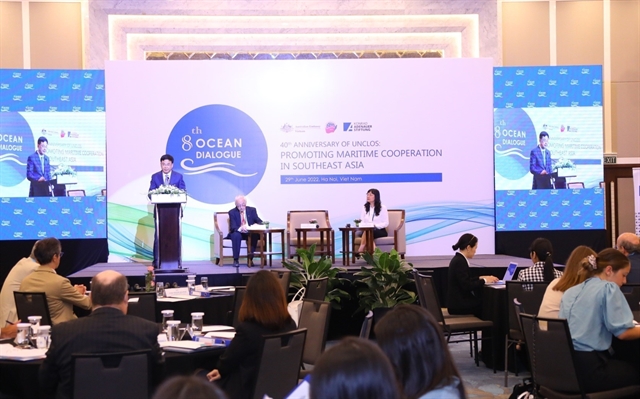 Society
Society

The eighth ocean dialogue was held on Wednesday in Hà Nội on the occasion of the 40th anniversary of UNCLOS with the theme of promoting maritime cooperation in Southeast Asia.

|
| Deputy Minister of Foreign Affairs Phạm Quang Hiệu delivers an opening speech at the eighth ocean dialogue. — VNA/VNS Photo |
HÀ NỘI — The eighth ocean dialogue was held on Wednesday in Hà Nội on the occasion of the 40th anniversary of UNCLOS with the theme of promoting maritime cooperation in Southeast Asia.
It drew the virtual and in-person participation of more than 250 domestic and foreign experts.
The event was jointly organised by the Diplomatic Academy of Vietnam (DAV), the Australian Embassy in Việt Nam and the Konrad Adenauer Stiftung Foundation (KAS).
In his opening speech, Deputy Minister of Foreign Affairs Phạm Quang Hiệu said the adoption of the 1982 United Nations Convention on the Law of the Sea (UNCLOS) 40 years ago is a historic milestone in the development of the international law of the sea. For the first time, a comprehensive legal framework, a "charter" of the sea was established.
The convention has laid a foundation for the development of the international law of the sea, promoting peace, security and cooperation among countries for sustainable development of seas and oceans.
He stressed that over the past 40 years, a legal order was set up following UNCLOS, contributing to maintaining international peace and stability. The settlement of sea disputes in line with international laws was promoted.
In the face of increasing sea-related challenges, Hiệu said the international community needs to abide by laws and legal obligations under the convention, particularly in making claims and carrying out activities on seas.
Countries need to boost cooperation at the regional and international level to preserve and sustainably use seas and oceans while ensuring the freedom of navigation and legal maritime activities, he said.
In 2021, Việt Nam was one of the 12 founding members of the Group of Friends on the UNCLOS. The group is expected to contribute to raising awareness and understanding of the convention and sharing good practices in applying the convention to maritime delimitation and peaceful settlement of disputes, according to Hiệu.
Professor Dr. Rüdiger Wolfrum, former Judge at the International Tribunal for the Law of the Sea, delivered a keynote speech in commemoration of the 40th anniversary of the UNCLOS. He reaffirmed the role of the convention in the development of the international law of the sea and in promoting peace, security and cooperation among nations as well as sustainable development of seas and oceans.
He said the UNCLOS needs to be applied comprehensively and it should not separate but closely link dispute settlement mechanisms with all legal regulations of the UNCLOS and international laws. Judgments of international courts do not simply bind the parties of disputes but also serve as a foundation for cooperation and have impacts on the region and international community.
The convention is an advanced mechanism in comparison with traditional ones but it will be continued to be improved to meet the requirements of the new situations, according to Wolfrum.
The dialogue consisted of four sessions. The first session focused on UNCLOS and the Southeast Asian region. It aimed to explore several under-researched maritime and legal issues related to the implementation of the UNCLOS in the Southeast Asia region, including the right of access of land-locked states and freedom of transit are provided under Part X of the convention and how the fact of not being a party to UNCLOS may affect the rights and obligations of coastal states in maritime delimitation and maritime cooperation.
The second session on emission reduction from shipping and net-zero shipping provided an overview of the negotiations at the International Maritime Organisation for the reduction of emissions from international shipping and the net-zero shipping initiative by the UK. Speakers recommended policies for regional countries towards a direction more consistent with the 2015 Paris Agreement.
The third session focused on obligations to cooperate between states bordering semi-enclosed seas. Article 123 of UNCLOS provides that states bordering semi-enclosed seas should cooperate with each other in the exercise of their rights and in the performance of their duties under this convention. In this session, speakers discussed how the obligation under Article 123 has been interpreted in case law and publications as well as best practices in other regions.
They also discussed how to enhance cooperation between Southeast Asia countries in maritime scientific research, exploration and exploitation of the living resources of the sea, and inviting other interested States or international organisations to cooperate in implementing the obligation under Article 123.
In the last session, scholars discussed conservation and sustainable use of marine biological diversity of areas beyond national jurisdiction, as well as explored future cooperation in Southeast Asia on these matters. — VNS




